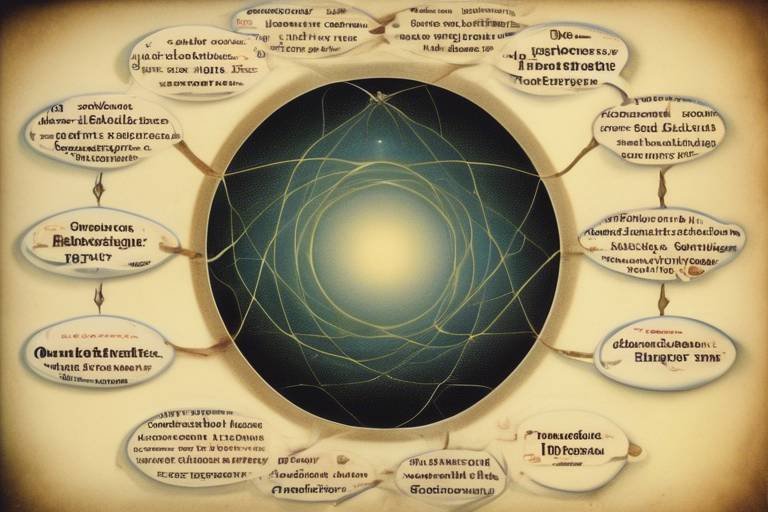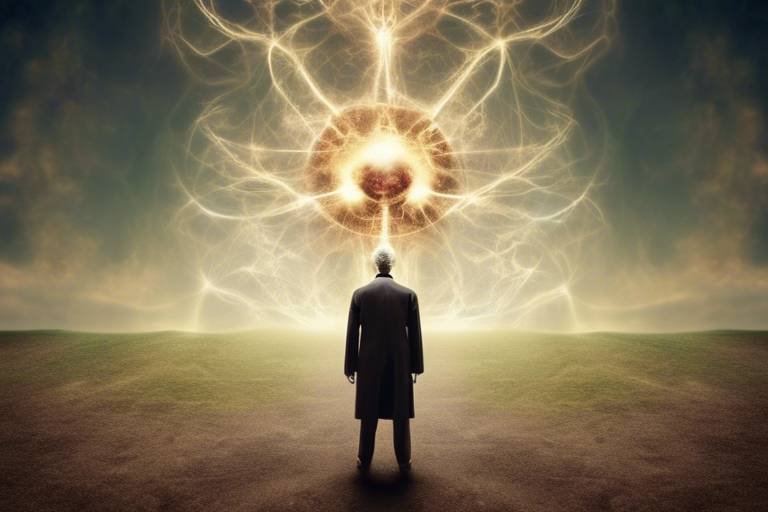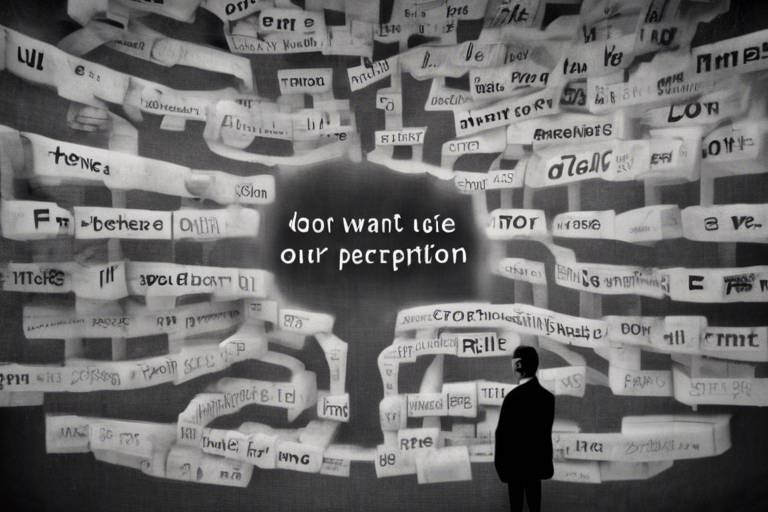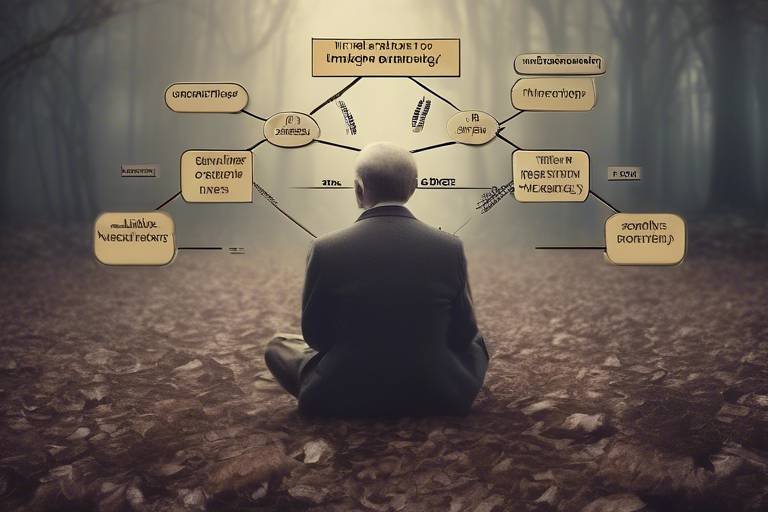Is Metaphysics an Instrument to Reach Higher Consciousness?
Have you ever pondered the mysteries of existence? The questions that swirl around the nature of reality, the universe, and our very selves? Well, you’re not alone! Many seekers embark on a quest for understanding that often leads them to the fascinating realm of metaphysics. This branch of philosophy dives deep into the fundamental nature of reality, seeking to answer profound questions about what lies beyond the physical world. But here's the kicker: metaphysics isn’t just an academic pursuit; it can be a powerful tool for achieving higher consciousness. In this article, we’ll explore how metaphysical principles can guide us on our journey towards a more enlightened state of being.
Imagine your consciousness as a vast ocean. On the surface, it may seem calm and clear, but beneath the waves lies a world teeming with life and mystery. Metaphysics acts like a diving bell, allowing us to plunge into the depths of our mind and spirit. By understanding its core concepts, we can uncover hidden truths about ourselves and our place in the cosmos. This journey isn’t just about intellectual understanding; it’s about personal and spiritual development, awakening to a reality that transcends the mundane.
So, what exactly is higher consciousness? Think of it as an elevated state of awareness where perception expands, allowing us to see beyond the ordinary. It’s like switching from a black-and-white TV to a vibrant, high-definition screen. You start to notice details and connections that were previously obscured. Higher consciousness encompasses profound insights, heightened intuition, and a deep sense of interconnectedness with all that exists. It’s a transformative experience that can significantly impact personal growth and spiritual awakening.
As we dive deeper, we must acknowledge the role of intuition in accessing higher consciousness. Intuition is that inner voice, the gut feeling that often guides us when logic falls short. It’s like having a built-in compass that points us toward metaphysical truths. By tapping into our intuitive abilities, we can align ourselves with the deeper aspects of consciousness, guiding us on our spiritual journey. But how do we cultivate this intuition? The answer lies in practices such as meditation and mindfulness. These techniques enhance our ability to connect with our inner selves and the universe around us.
However, it’s essential to strike a balance between intuition and rationality. While intuition can illuminate our path, rational thought provides the structure we need to navigate complex metaphysical concepts. By integrating both, we can develop a comprehensive understanding of our consciousness and the universe. This balance is crucial as we explore various metaphysical practices, such as visualization and affirmations, which can facilitate our journey towards higher consciousness.
As we explore the interconnection of mind and spirit, we realize that understanding this relationship is vital for achieving higher consciousness. Metaphysical frameworks can bridge the gap between these two realms, allowing us to see how our thoughts and beliefs shape our spiritual experiences. Psychology offers valuable insights into the workings of the mind, complementing our metaphysical exploration. By integrating these perspectives, we can deepen our understanding of consciousness, paving the way for profound spiritual awakenings.
Yet, the path to higher consciousness is not without its challenges. Doubts and skepticism can creep in, hindering our progress. Overcoming these doubts is essential for fostering belief in metaphysical concepts. Strategies such as journaling about our experiences and engaging in discussions with like-minded individuals can help us navigate these obstacles. Moreover, integrating our metaphysical experiences into daily life is crucial for lasting change. It’s about embodying the insights we gain and allowing them to transform our actions and perspectives.
In conclusion, metaphysics serves as a powerful instrument for reaching higher consciousness. By exploring its principles, we embark on a journey of self-discovery that can lead to profound personal and spiritual growth. So, are you ready to dive into the depths of your consciousness and uncover the mysteries that await? The adventure of a lifetime is just a thought away!
- What is metaphysics? Metaphysics is a branch of philosophy that explores the fundamental nature of reality, existence, and the universe.
- How does higher consciousness differ from regular consciousness? Higher consciousness refers to an elevated state of awareness and perception, allowing for deeper insights and connections.
- Can anyone achieve higher consciousness? Yes! With the right practices and mindset, anyone can work towards achieving higher consciousness.
- What practices can help develop intuition? Meditation, mindfulness, and journaling are effective practices for cultivating intuitive skills.
- How can I overcome doubts on my spiritual journey? Engaging in discussions, journaling experiences, and seeking support from others can help overcome skepticism.

The Nature of Metaphysics
Metaphysics, at its core, is a fascinating branch of philosophy that dives deep into the fundamental questions surrounding existence, reality, and the universe. Imagine standing at the edge of a vast ocean, gazing into the depths, and pondering what lies beneath the surface. This is akin to the journey metaphysics invites us to embark upon. It encourages us to explore not just the physical world we see, but also the unseen forces and principles that govern our lives and the cosmos.
To grasp the essence of metaphysics, one must first understand its core concepts. These concepts often include:
- Ontology: The study of being and existence.
- Cosmology: The exploration of the universe's origins and structure.
- Epistemology: The investigation of knowledge and belief.
These foundational elements serve as a springboard for deeper exploration into higher consciousness. As we seek answers to profound questions like "What is the nature of reality?" and "What lies beyond our physical existence?", we begin to uncover the metaphysical principles that can guide us on our spiritual journey.
Moreover, metaphysics challenges us to look beyond the material world and consider the interconnectedness of all things. It proposes that everything in the universe is not just a collection of atoms but is imbued with meaning and purpose. This perspective can be transformative, encouraging us to view our lives through a lens of unity and interconnectedness.
In essence, metaphysics is not merely an abstract discipline; it is a practical tool that can help us navigate the complexities of life. By understanding its principles, we can cultivate a greater awareness of ourselves and the universe around us, paving the way for personal and spiritual development. As we delve deeper into metaphysical explorations, we often find ourselves on a path toward higher consciousness, where profound insights and transformative experiences await.

The Concept of Higher Consciousness
Higher consciousness is a term that often floats around in spiritual discussions, but what does it really mean? Imagine being on a journey where every step takes you closer to a profound understanding of yourself and the universe. This elevated state of awareness is not just about having a deeper insight into life; it’s about experiencing a shift in perception that opens up new dimensions of thought and feeling. It's like upgrading your mind's software to a version that can handle more complex and beautiful realities.
At its core, higher consciousness refers to a state of awareness that transcends the ordinary experiences of daily life. It’s about peeling back the layers of mundane existence to reveal the deeper truths that lie beneath. People often describe it as a feeling of interconnectedness with everything around them—a realization that we are all part of a larger tapestry. This state can manifest in various ways, such as heightened intuition, increased empathy, and a sense of peace that is hard to put into words. Have you ever felt that moment where everything just clicks, and you understand your place in the universe? That's a glimpse of higher consciousness!
To further grasp the significance of higher consciousness, let’s break down some of its key characteristics:
- Expanded Awareness: This involves seeing beyond the physical realm and recognizing the spiritual dimensions of existence.
- Intuitive Insight: Higher consciousness often enhances our intuitive abilities, allowing us to tap into knowledge that isn't always accessible through rational thought.
- Emotional Clarity: People in higher states of consciousness frequently report experiencing emotions more deeply and authentically.
- Connection to Others: There's a profound sense of unity with others and the environment, fostering compassion and understanding.
But why is higher consciousness important for personal growth and spiritual awakening? Well, think of it as the ultimate tool for transformation. When you operate from this elevated state, you’re not just reacting to life; you’re actively creating it. You begin to see challenges not as obstacles but as opportunities for growth. This shift in mindset can propel you forward in ways you never thought possible.
Moreover, higher consciousness is often linked to spiritual awakening. This awakening can be a gradual process or a sudden epiphany, but it typically involves a significant shift in how we perceive reality. It’s a bit like waking up from a long sleep; suddenly, the world is brighter, and everything seems to have more meaning. Many people describe their spiritual awakening as a journey that leads them to a deeper understanding of their purpose and connection to the universe.
In summary, higher consciousness is not just a lofty idea; it’s a practical framework for understanding our existence. By striving for this elevated state of awareness, we can enhance our personal development and spiritual growth. It’s an invitation to explore the depths of our being and to embrace the magic of life in all its forms. So, are you ready to embark on this journey toward higher consciousness?
- What is higher consciousness? Higher consciousness refers to an elevated state of awareness and perception that transcends ordinary experiences, leading to deeper insights and connections.
- How can I achieve higher consciousness? Practices such as meditation, mindfulness, and self-reflection can help you tap into higher consciousness.
- Is higher consciousness the same as spiritual awakening? While they are related, higher consciousness is a state of awareness, whereas spiritual awakening is often a transformative experience that leads to this state.
- What role does intuition play in higher consciousness? Intuition is a key component, as it allows individuals to access deeper truths and insights that guide their spiritual journey.

The Role of Intuition
Intuition is often described as that little voice inside our heads, a gut feeling that guides us through the maze of life. But what if I told you that this inner knowing is not just a random occurrence? Instead, it can be a powerful tool in accessing higher consciousness. When we tap into our intuition, we open the door to a realm of metaphysical truths that can profoundly influence our personal and spiritual journeys.
Imagine intuition as a compass, pointing us toward our true north. This compass does not rely on external validation or logical reasoning; rather, it draws from a deeper understanding of the universe and our place within it. The beauty of intuition lies in its ability to transcend the limitations of rational thought, allowing us to connect with the essence of our being. But how do we cultivate this vital skill?
To enhance our intuitive abilities, we can engage in various practices that foster a deeper connection with ourselves and the universe. Here are some effective techniques:
- Meditation: By quieting the mind, we create space for intuitive insights to emerge. Regular meditation helps us tune into our inner voice.
- Mindfulness: Being present in the moment allows us to notice subtle cues and feelings that can guide us toward intuitive understanding.
- Journaling: Writing down our thoughts and feelings can help clarify our intuition, making it easier to recognize patterns and insights.
As we develop these skills, we may find ourselves facing a fascinating dynamic: the relationship between intuition and rationality. While intuition provides profound insights, rational thought is essential for analyzing and implementing these insights into our lives. Think of it like a dance; intuition leads, and rationality follows, creating a harmonious flow of understanding. Balancing these two aspects can enhance our comprehension of metaphysical concepts, allowing us to navigate our spiritual journeys with confidence.
In conclusion, intuition is not just a whimsical notion; it is a vital component in the quest for higher consciousness. By embracing our intuitive nature, we can align ourselves with the metaphysical truths that guide us toward personal and spiritual development. So, the next time you feel that gut instinct nudging you, listen closely—it might just be the universe whispering secrets meant for you.

Developing Intuitive Skills
Developing intuitive skills is like tuning a musical instrument; it requires patience, practice, and a willingness to listen. Intuition is that inner voice, the gut feeling that often knows things before our rational mind catches up. To enhance this precious ability, we must engage in practices that quiet the noise of daily life, allowing us to hear our inner wisdom more clearly. One of the most effective methods for cultivating intuition is through meditation. By dedicating just a few minutes each day to sit in silence, we create a space for our thoughts to settle, making room for intuitive insights to emerge.
In addition to meditation, mindfulness plays a crucial role in developing intuitive skills. This practice encourages us to be present in the moment, heightening our awareness of our feelings, thoughts, and surroundings. When we become more attuned to the subtle cues around us, we can better recognize the whispers of our intuition. Engaging in activities that promote mindfulness, such as yoga or even mindful walking, can significantly enhance our intuitive abilities.
Another powerful technique for developing intuition is journaling. Keeping a journal allows us to reflect on our experiences, emotions, and the intuitive nudges we receive. By writing down our thoughts and feelings, we create a tangible record of our intuitive insights, which can be incredibly valuable for future reference. Over time, we may notice patterns or recurring themes in our intuition, helping us to trust it more fully.
To deepen our intuitive skills, we can also explore visualization techniques. By imagining ourselves in various scenarios, we can tap into our intuitive responses and learn to differentiate between fear-based thoughts and genuine intuitive guidance. For instance, visualizing a decision we need to make and observing our feelings about it can provide clarity. Are we feeling anxious or excited? The emotions we experience can serve as a compass, guiding us toward the right path.
Lastly, it’s essential to embrace playfulness in developing our intuition. Allowing ourselves to engage in creative activities, whether it’s painting, dancing, or playing an instrument, can help us connect with our intuitive side. Creativity often flows from intuition, and by nurturing this playful spirit, we can open the door to deeper insights and understanding.
As we embark on this journey of developing our intuitive skills, it’s important to remember that everyone’s path is unique. Some may find certain practices resonate more than others. The key is to explore various methods and discover what works best for you. With dedication and an open heart, you’ll find that your intuitive abilities can grow stronger, guiding you toward higher consciousness and a more profound understanding of yourself and the universe.
- What is intuition? Intuition is the ability to understand something instinctively without the need for conscious reasoning. It often manifests as a gut feeling or an inner voice.
- How can I tell if my intuition is guiding me? Pay attention to your emotions and physical sensations. If something feels right or resonates positively within you, it’s likely your intuition at work.
- Can everyone develop their intuition? Yes! Intuition is a natural ability that everyone possesses. With practice and dedication, anyone can strengthen their intuitive skills.
- Is meditation necessary for developing intuition? While meditation is a powerful tool for enhancing intuition, it’s not the only way. Mindfulness, journaling, and creative activities can also help cultivate intuitive abilities.
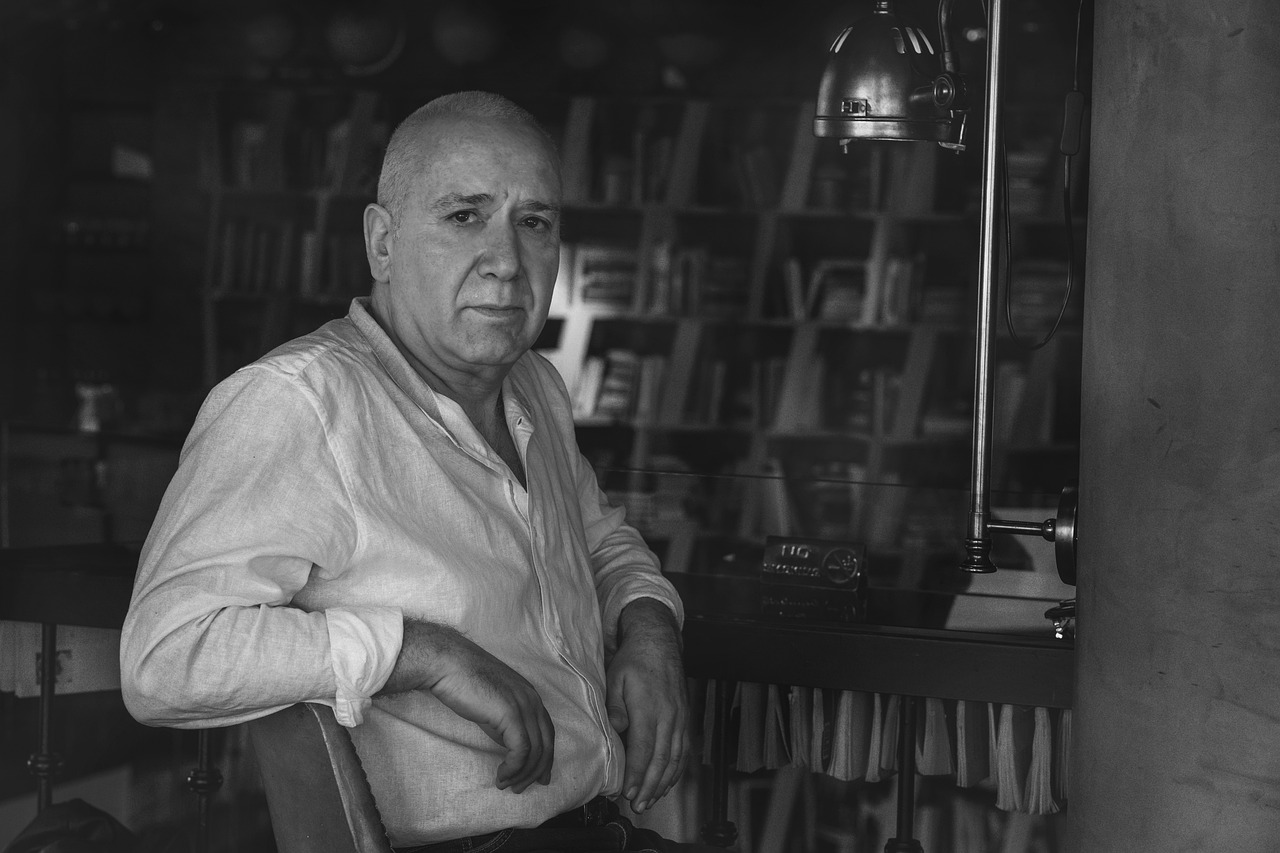
Intuition vs. Rationality
When we embark on the journey towards higher consciousness, one of the most intriguing dynamics we encounter is the relationship between intuition and rationality. These two modes of thinking often seem to be at odds with each other, like two dancers in a complex ballet, each trying to lead. Intuition, characterized by a gut feeling or an instinctual understanding, operates in the realm of the subconscious. It’s that little voice that whispers in your ear, guiding you toward decisions that feel right, even if they defy logical reasoning.
On the other hand, rationality is the structured, analytical part of our mind that relies on facts, evidence, and logical reasoning. It’s the part that weighs pros and cons, analyzing data and drawing conclusions based on what is observable. While rationality has its strengths, it can sometimes be a double-edged sword, leading us to overthink or dismiss feelings that don’t align with our logical framework.
So, how do we find balance between these two? It’s essential to recognize that both intuition and rationality have their places in our pursuit of higher consciousness. For instance, there are moments when relying solely on logic can leave us feeling disconnected from our true selves. Conversely, solely depending on intuition without any rational thought can lead to impulsive decisions that may not serve our best interests.
To illustrate this balance, consider the following table that outlines the key differences between intuition and rationality:
| Aspect | Intuition | Rationality |
|---|---|---|
| Source | Subconscious | Conscious |
| Process | Instinctual | Analytical |
| Decision-making | Quick and often emotional | Slow and methodical |
| Outcome | Can lead to profound insights | Can lead to logical conclusions |
Finding harmony between these two faculties can enrich our understanding of metaphysical concepts and enhance our journey toward higher consciousness. For example, when making a significant life decision, you might feel an intuitive pull toward a particular path. Instead of dismissing this feeling, you can take a moment to analyze the situation rationally—considering the facts, potential outcomes, and implications of your choice. This approach allows you to harness the strengths of both intuition and rationality, leading to more holistic decision-making.
In essence, embracing both intuition and rationality is like having a toolbox filled with various tools. Each tool serves a specific purpose, and knowing when to use which one can significantly impact our spiritual growth. So, the next time you find yourself faced with a decision, take a moment to tune into your intuition while also applying your rational mind. This interplay can open doors to deeper understanding and facilitate your quest for higher consciousness.
- What is intuition? Intuition is the ability to understand something instinctively, without the need for conscious reasoning.
- How can I develop my intuitive skills? Practices like meditation, mindfulness, and journaling can help enhance your intuition.
- Is rationality important in spiritual growth? Yes, rationality helps ground our experiences and ensures we make informed decisions on our spiritual journey.
- Can intuition and rationality coexist? Absolutely! Balancing both can lead to more profound insights and better decision-making.

Metaphysical Practices
When we think about , we often envision a mystical journey that transcends the ordinary. These practices serve as powerful tools that can help us tap into the deeper layers of our consciousness, ultimately guiding us toward higher states of awareness. Among the most effective metaphysical practices are meditation, visualization, and affirmations. Each of these techniques offers unique benefits that can facilitate our spiritual growth and enhance our understanding of the universe.
Meditation is perhaps the cornerstone of metaphysical practices. It allows us to quiet the mind and delve into the vastness of our inner selves. Through regular meditation, we can cultivate a sense of peace and clarity, making it easier to connect with higher consciousness. Imagine your mind as a cluttered attic; meditation is like taking the time to sort through the boxes, clearing out the unnecessary items to reveal the treasures hidden beneath. This process not only calms the mind but also opens the door to profound insights and intuitive knowledge.
Visualization is another powerful practice that can enhance our metaphysical journey. By creating vivid mental images of our goals, desires, or spiritual truths, we align our energy with those aspirations. Visualization acts as a bridge between the mind and the spirit, allowing us to manifest our intentions more effectively. For instance, envisioning yourself surrounded by light during a challenging moment can help you draw upon that energy, empowering you to navigate obstacles with grace. The mind is a creative force, and through visualization, we can harness that creativity to shape our reality.
Affirmations play a crucial role in reinforcing our metaphysical beliefs. By repeating positive statements, we can reprogram our subconscious mind, transforming limiting beliefs into empowering ones. Think of affirmations as seeds planted in the fertile soil of your mind; with consistent nurturing, they can grow into powerful realities. For example, affirming statements like "I am connected to the universe" or "I trust my intuition" helps cultivate a mindset conducive to higher consciousness. Over time, these affirmations can shift our perception, allowing us to experience life through a more expansive lens.
Incorporating these metaphysical practices into our daily routine can create a profound shift in our consciousness. However, it's essential to approach them with an open mind and a willingness to explore. Every individual's journey is unique, and what resonates with one person may differ for another. Thus, experimenting with various techniques and finding what works best for you is vital. Whether through a quiet meditation session, a vibrant visualization exercise, or the daily repetition of affirmations, these practices can serve as gateways to a deeper understanding of ourselves and the universe.
As we engage in these practices, we may also encounter moments of doubt or confusion. It's crucial to remember that the path to higher consciousness is not always linear. Embracing the process, with all its twists and turns, allows us to grow and evolve. By staying committed to our metaphysical practices, we can navigate the challenges and emerge with greater wisdom and insight.
- What is the best time to practice meditation? Many find early morning or late evening to be ideal, as these times are often quieter and allow for deeper focus.
- How long should I meditate each day? Starting with just 5-10 minutes can be effective; gradually increasing the duration as you become more comfortable.
- Can anyone practice visualization? Absolutely! Visualization is accessible to everyone and can be tailored to your personal beliefs and goals.
- Are affirmations effective? Yes, when practiced consistently, affirmations can significantly influence your mindset and help manifest your desires.
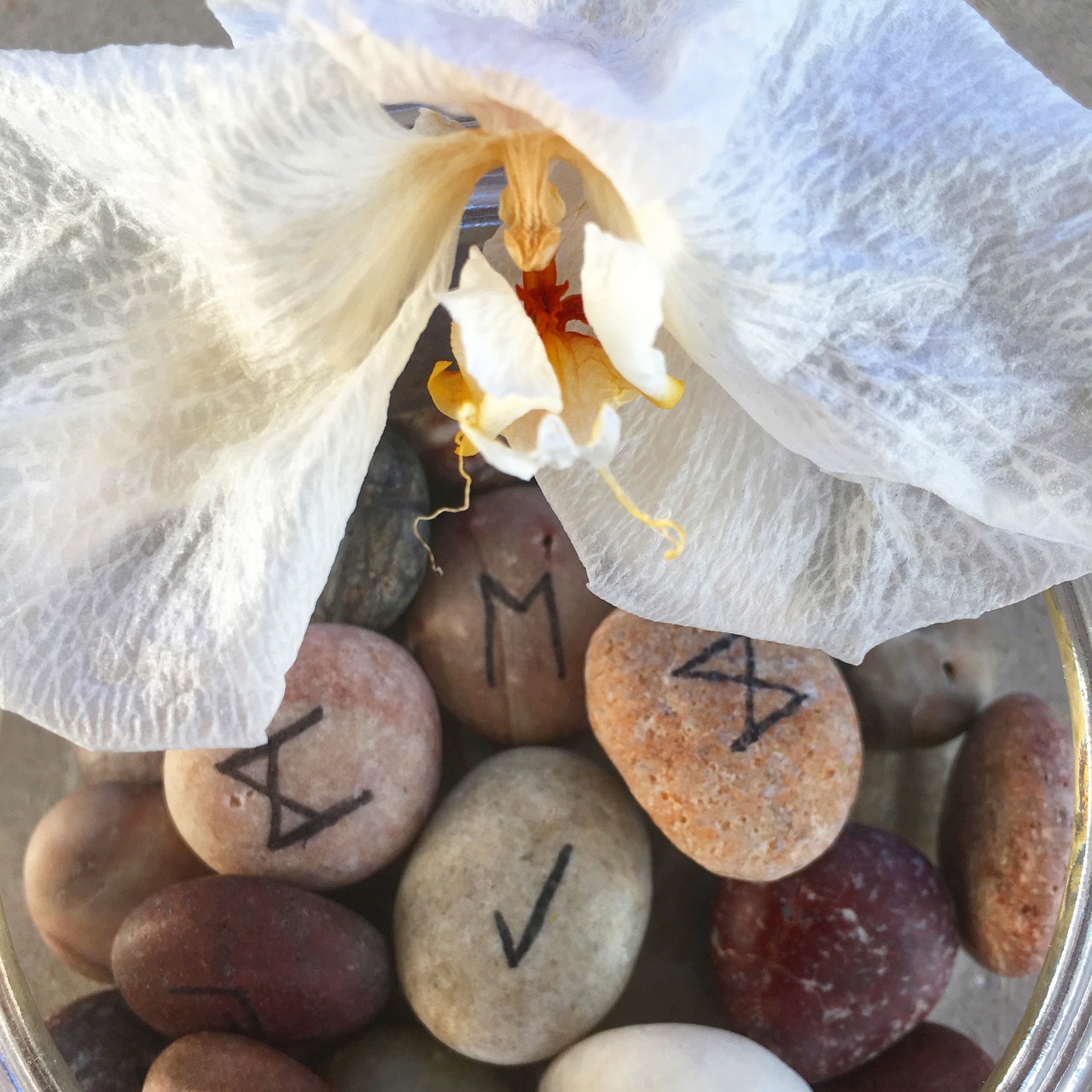
The Interconnection of Mind and Spirit
Understanding the intricate relationship between the mind and spirit is crucial for anyone seeking to achieve higher consciousness. Imagine your mind as a vast ocean, filled with waves of thoughts, emotions, and perceptions, while your spirit is like the sun shining above that ocean, illuminating your path and guiding you through the depths of existence. This metaphor beautifully encapsulates how these two realms interact and influence one another.
At its core, the mind is the seat of our thoughts, beliefs, and rationality. It processes information, analyzes experiences, and helps us navigate the physical world. The spirit, on the other hand, embodies our essence, our true self beyond the confines of the physical body. It connects us to the universe, to others, and to a higher power or consciousness. When we recognize the importance of both, we can begin to see how they work in harmony to elevate our understanding and awareness.
Metaphysical frameworks provide a unique lens through which we can explore this interconnection. For instance, many metaphysical teachings emphasize the idea that our thoughts shape our reality. This principle suggests that by altering our mental patterns, we can influence our spiritual experiences and vice versa. The table below summarizes some key aspects of the mind-spirit connection:
| Aspect | Mind | Spirit |
|---|---|---|
| Nature | Analytical, rational | Intuitive, transcendent |
| Function | Processes information | Connects with the universe |
| Influence | Shapes perceptions | Guides purpose |
| Growth | Learning and understanding | Awakening and realization |
By engaging in practices that enhance both mental clarity and spiritual awareness, we can create a balanced approach to personal growth. For example, meditation serves as a bridge between the mind and spirit. It quiets the mental chatter, allowing us to tap into our inner wisdom and connect with our spiritual essence. Similarly, mindfulness encourages us to be present, fostering a deeper understanding of our thoughts and feelings, which can lead to greater spiritual insight.
Moreover, psychological perspectives can enrich our understanding of this interconnection. Psychology helps us to analyze our mental processes, identify limiting beliefs, and understand emotional responses. By integrating psychological insights with metaphysical principles, we can gain a more comprehensive view of our consciousness. This integration allows us to navigate our spiritual journeys with a clearer mindset and a more profound sense of purpose.
Ultimately, the journey toward higher consciousness is not just about transcending the mind or spirit; it's about recognizing their interdependence. When we embrace this connection, we open ourselves up to a world of possibilities. We begin to see that our thoughts can elevate our spirit, and our spiritual experiences can enrich our mental landscape. This symbiotic relationship is the key to unlocking the full potential of our consciousness.
- What is higher consciousness? Higher consciousness refers to elevated states of awareness and perception that allow individuals to experience a deeper understanding of reality.
- How can I develop my intuition? Practices such as meditation, mindfulness, and self-reflection can help cultivate your intuitive abilities.
- What role does meditation play in connecting mind and spirit? Meditation helps quiet the mind, allowing for deeper spiritual connection and insight.
- Can psychology and metaphysics work together? Yes, integrating psychological insights with metaphysical principles can enhance our understanding of consciousness and personal growth.

Psychological Perspectives
The field of psychology offers a rich tapestry of insights that can greatly enhance our understanding of metaphysics and higher consciousness. At its core, psychology seeks to unravel the complexities of the human mind, exploring how our thoughts, emotions, and behaviors interact. This exploration is not just about understanding the mind in isolation; it also provides a vital context for the metaphysical principles that guide our spiritual journeys. Imagine psychology as the map that helps us navigate the vast terrain of consciousness, while metaphysics serves as the compass directing us towards deeper truths.
One of the key psychological theories that intersects with metaphysical exploration is transpersonal psychology. This branch of psychology focuses on the spiritual aspects of the human experience, examining how individuals can transcend their ordinary consciousness to achieve higher states of awareness. By studying transpersonal psychology, we can gain insights into how spiritual experiences and metaphysical beliefs influence our psychological well-being. For instance, many individuals report profound feelings of interconnectedness and unity with the universe during moments of spiritual awakening. These experiences can lead to significant shifts in perspective, fostering a sense of purpose and meaning in life.
Additionally, psychological concepts such as cognitive dissonance play a crucial role in our journey towards higher consciousness. When we encounter metaphysical ideas that challenge our existing beliefs, we may experience discomfort or confusion. This is where cognitive dissonance comes into play, as our minds strive to reconcile conflicting thoughts. Understanding this phenomenon can empower us to embrace change rather than shy away from it. By acknowledging our doubts and uncertainties, we open the door to deeper exploration and growth.
Furthermore, the practice of mindfulness, which has its roots in psychological research, aligns beautifully with metaphysical principles. Mindfulness encourages us to be present in the moment, fostering a profound connection with our inner selves and the world around us. This practice not only enhances our awareness but also cultivates a sense of peace and clarity that is essential for accessing higher consciousness. As we become more attuned to our thoughts and feelings, we can better understand the metaphysical truths that resonate with our experiences.
To illustrate the relationship between psychology and metaphysics, consider the following table that outlines key psychological concepts and their metaphysical counterparts:
| Psychological Concept | Metaphysical Counterpart |
|---|---|
| Transpersonal Psychology | Spiritual Awakening |
| Cognitive Dissonance | Embracing Change |
| Mindfulness | Present Moment Awareness |
| Self-Actualization | Higher Self |
In summary, the interplay between psychological perspectives and metaphysical principles creates a powerful framework for understanding higher consciousness. By integrating insights from psychology, we can navigate the complexities of our spiritual journeys with greater clarity and purpose. This synergy not only deepens our comprehension of metaphysical concepts but also enriches our personal growth and self-discovery.
- What is higher consciousness? Higher consciousness refers to elevated states of awareness where individuals perceive and understand deeper truths about existence and their place in the universe.
- How does psychology relate to metaphysics? Psychology provides insights into the workings of the mind, which can complement metaphysical exploration by helping individuals navigate their spiritual journeys.
- Can mindfulness practices enhance higher consciousness? Yes, mindfulness practices cultivate present moment awareness, allowing individuals to connect with deeper aspects of consciousness and metaphysical truths.

Spiritual Awakening
Spiritual awakening is often described as a profound shift in consciousness that can transform how we perceive ourselves and the world around us. Imagine standing on the edge of a cliff, looking out over a vast ocean, and realizing that the horizon stretches far beyond what you initially thought possible. This awakening can feel exhilarating yet daunting, as it invites us to step into a new realm of understanding that challenges our previous beliefs and assumptions.
At its core, spiritual awakening is about uncovering deeper truths about existence. It’s like peeling back the layers of an onion; each layer reveals more about our essence and the interconnectedness of all things. During this process, individuals often experience a heightened sense of awareness, a feeling of unity with the universe, and an innate understanding of their purpose in life. These moments can feel like bursts of light illuminating the dark corners of our minds, helping us to see things as they truly are.
However, the journey of spiritual awakening is not without its challenges. Many people encounter a sense of confusion or fear as they grapple with the implications of their new insights. It can feel like standing in the middle of a storm, with thoughts and emotions swirling around, making it hard to find solid ground. Yet, this is where metaphysical insights become invaluable. They serve as a compass, guiding us through the tumultuous waters of transformation. By embracing metaphysical principles, we can navigate the complexities of our spiritual journey with greater ease.
One key aspect of spiritual awakening is the realization that we are more than just our physical bodies or our thoughts. This understanding can lead to a profound sense of peace and acceptance. Many individuals report experiencing moments of bliss, clarity, and an overwhelming love for themselves and others. It’s as if a veil has been lifted, allowing them to see the beauty in every moment, even in the mundane. This shift in perspective can be life-changing, fostering a deeper connection to both the self and the universe.
To facilitate spiritual awakening, many people turn to various practices that align with metaphysical principles. These may include:
- Meditation: A powerful tool for quieting the mind and accessing deeper states of awareness.
- Visualization: Using mental imagery to manifest desired outcomes and connect with higher aspects of consciousness.
- Affirmations: Positive statements that reinforce our intentions and help shift our mindset toward growth and understanding.
As we engage in these practices, we begin to cultivate a deeper relationship with our inner selves, which can lead to a more profound spiritual awakening. It’s essential to remember that this journey is unique for each individual. Just like a fingerprint, no two awakenings are the same. Some may experience sudden revelations, while others may find their awakening unfolding gradually over time.
Moreover, the integration of spiritual awakening into daily life is crucial for sustaining the insights gained during this transformative process. It’s like planting a seed; with proper care and attention, it can grow into something beautiful. This involves embracing new habits, surrounding ourselves with supportive communities, and remaining open to continuous learning. By doing so, we can embody the changes that come with awakening, allowing them to permeate every aspect of our lives.
In conclusion, spiritual awakening is a journey of discovery, transformation, and profound insight. It encourages us to explore the depths of our consciousness and embrace the interconnectedness of all beings. While the path may present challenges, the rewards are immeasurable. As we awaken, we not only enhance our own lives but also contribute to the collective consciousness of humanity, fostering a world filled with compassion, understanding, and love.
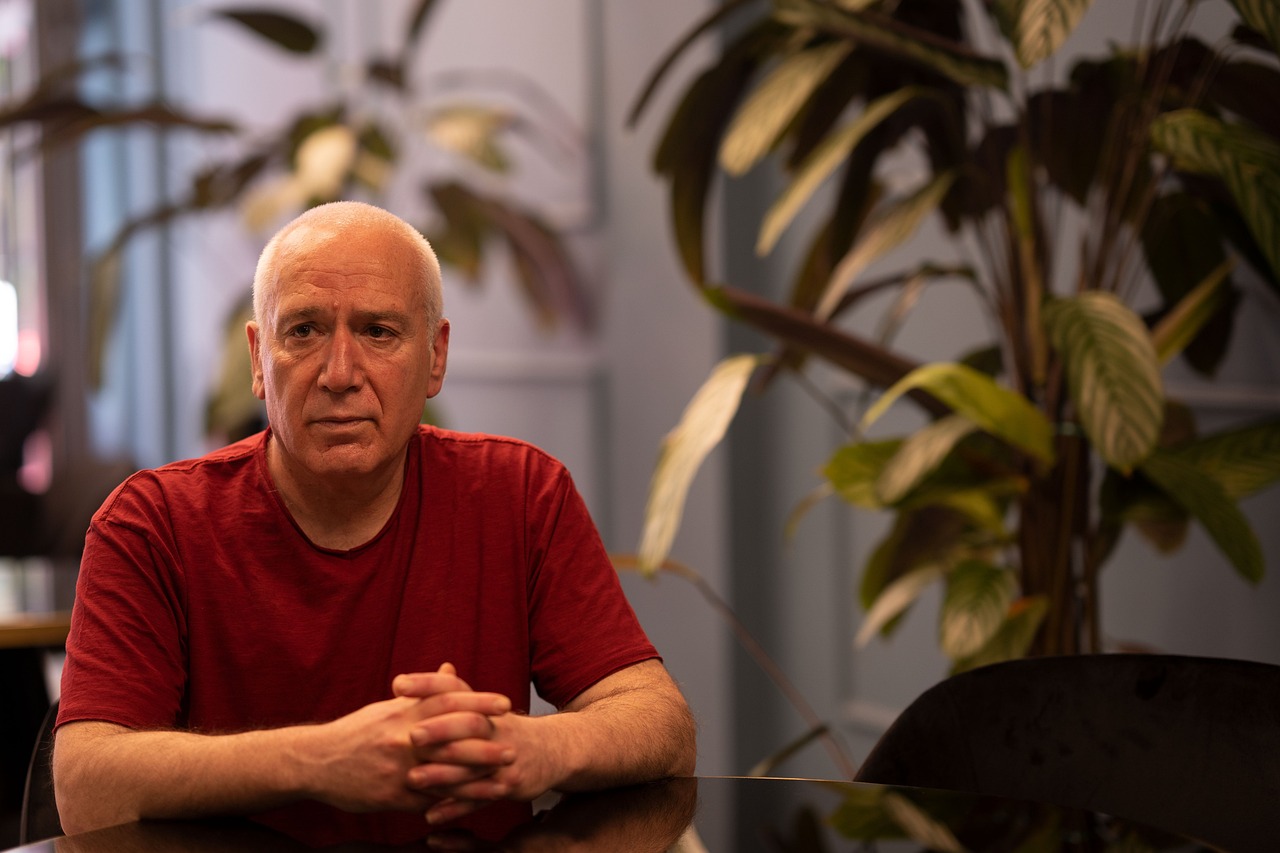
Challenges on the Path
The journey toward higher consciousness is not a straight path paved with flowers; rather, it often resembles a winding road filled with unexpected twists and turns. As we delve deeper into metaphysical principles, we encounter various challenges that can impede our progress. Understanding these obstacles is crucial, as they can teach us valuable lessons and propel us toward greater awareness. One of the most common hurdles is the presence of self-doubt. Have you ever found yourself questioning your beliefs or the validity of your experiences? This skepticism can be paralyzing, making it difficult to move forward on your spiritual journey.
Another significant challenge is the tendency to become overwhelmed by the vastness of metaphysical concepts. With so much information available, it's easy to feel lost or confused. This is where grounding practices become essential. By integrating simple techniques into your daily routine, such as meditation or journaling, you can create a sense of stability that allows you to navigate these complexities with ease. Remember, it's not about understanding everything at once; it's about taking small, manageable steps toward enlightenment.
Moreover, the integration of metaphysical experiences into everyday life can pose a challenge. After a profound meditation session or a moment of clarity, returning to the mundane can feel jarring. It's essential to find ways to embody these insights in your daily interactions. For instance, consider keeping a spiritual journal where you can document your experiences, thoughts, and feelings. This practice not only helps in processing your journey but also serves as a reminder of the growth you've achieved.
To further illustrate these challenges, let's take a look at some common obstacles faced by individuals on their quest for higher consciousness:
| Challenge | Description | Possible Solutions |
|---|---|---|
| Self-Doubt | Questioning the validity of your experiences and beliefs. | Practice self-compassion and remind yourself of past successes. |
| Overwhelm | Feeling lost due to the vastness of metaphysical concepts. | Focus on one concept at a time and use grounding techniques. |
| Integration | Struggling to apply metaphysical insights in daily life. | Keep a spiritual journal and reflect on your experiences. |
As you navigate these challenges, remember that they are not roadblocks but stepping stones to your personal growth. Embrace the discomfort and uncertainty, for they often precede profound breakthroughs. By acknowledging these difficulties and utilizing metaphysical principles to overcome them, you can transform your spiritual journey into a rich tapestry of experiences that lead to higher consciousness.
- What is higher consciousness? Higher consciousness refers to elevated states of awareness and perception that allow individuals to connect with deeper truths about existence and their place in the universe.
- How can I overcome self-doubt on my spiritual journey? Practicing self-compassion, seeking support from like-minded individuals, and reminding yourself of your past successes can help mitigate self-doubt.
- What are some effective grounding techniques? Techniques such as meditation, journaling, and spending time in nature can help ground you and provide clarity on your spiritual path.
- Why is integration important in spiritual growth? Integrating metaphysical experiences into daily life helps solidify your understanding and allows you to embody the insights gained, leading to lasting change.

Overcoming Doubts
When embarking on the journey toward higher consciousness, it's not uncommon to encounter a myriad of doubts that can cloud our path. These doubts often stem from our conditioned beliefs, societal norms, or even past experiences that have left us questioning our abilities and the validity of metaphysical concepts. The key to overcoming these doubts lies in understanding their origins and actively working to transform them into empowering beliefs.
First and foremost, it's essential to recognize that doubt is a natural part of the human experience. Just like a stormy sea can challenge a ship's journey, doubts can shake our confidence and make us question our spiritual pursuits. However, instead of viewing doubt as an obstacle, we can reframe it as an opportunity for growth. Each doubt we face can serve as a stepping stone towards deeper understanding and personal development.
One effective strategy for overcoming doubts is to engage in self-reflection. By taking the time to explore the root causes of our doubts, we can gain clarity and insight into our beliefs. Consider asking yourself questions like:
- What specific experiences have led me to doubt my intuition or metaphysical beliefs?
- Are these doubts based on factual evidence or merely fears and assumptions?
- How can I challenge these doubts with positive affirmations or experiences?
Another powerful tool is the practice of affirmations. By repeating positive affirmations that resonate with your spiritual journey, you can gradually shift your mindset from one of skepticism to one of belief and trust. For instance, you might say, “I trust my intuition to guide me on my path,” or “I am open to the metaphysical truths that surround me.” Consistently affirming these statements can help reinforce a strong foundation of belief and confidence.
Additionally, surrounding yourself with a supportive community can make a significant difference in overcoming doubts. Engaging with like-minded individuals who share similar interests in metaphysics can provide encouragement and validation. Whether through online forums, local meetups, or spiritual workshops, connecting with others can help you realize that you are not alone in your struggles and that many others have successfully navigated similar doubts.
Lastly, remember that overcoming doubts is a journey, not a destination. Just as a river flows and changes course, our understanding of metaphysics and higher consciousness will evolve over time. Embrace the process, and allow yourself the grace to experience doubts without judgment. Each time you confront and work through a doubt, you are not only strengthening your belief system but also paving the way for a more profound connection with your higher self.
Here are some common questions that may arise when dealing with doubts on the path to higher consciousness:
- What if I feel overwhelmed by my doubts? It's okay to feel overwhelmed. Start by taking small steps, such as journaling your thoughts or practicing mindfulness to center yourself.
- Can I trust my intuition if I'm experiencing doubts? Yes! Trusting your intuition is a skill that can be developed. Give yourself permission to explore and validate your intuitive feelings.
- How can I find a supportive community? Look for local spiritual groups, online forums, or social media communities that align with your interests in metaphysics and higher consciousness.
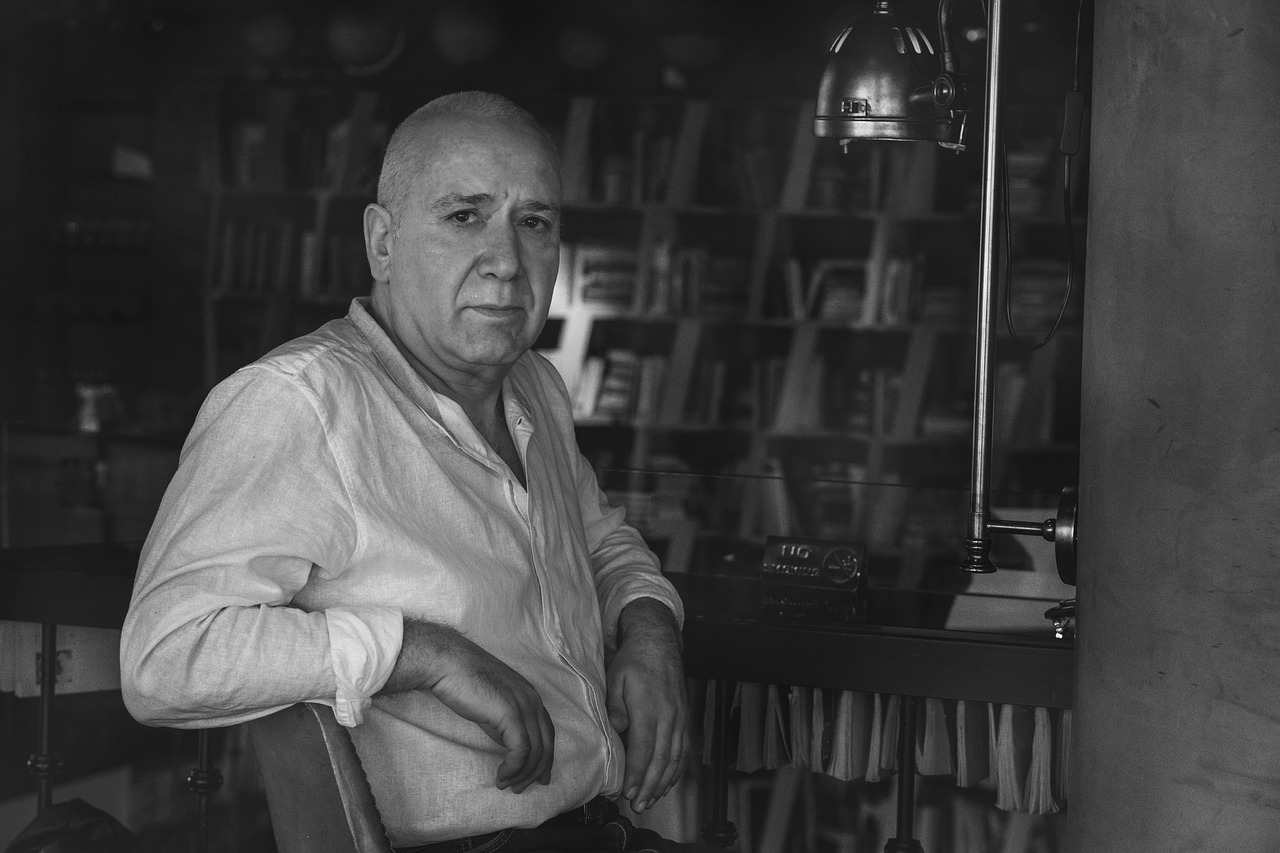
Integrating Experiences
Integrating experiences from metaphysical practices into our daily lives is not just beneficial; it's essential for genuine growth and transformation. Imagine embarking on a thrilling adventure where each experience is like a treasure chest filled with insights waiting to be unlocked. However, the challenge lies in how we incorporate these gems into our everyday existence. It's easy to get caught up in the mystical allure of metaphysics, but the real magic happens when we ground these experiences in our reality.
One effective way to integrate these experiences is through **reflection**. Taking time to ponder what you've learned during meditation, visualization, or even during a profound moment of intuition can help solidify those insights. Consider keeping a journal dedicated to your metaphysical journey. In it, you can jot down your thoughts, feelings, and revelations. This practice not only enhances your understanding but also serves as a roadmap for your spiritual growth.
Another method to integrate your metaphysical experiences is through **daily affirmations**. These are powerful tools that can help you manifest the insights you’ve gained. For instance, if you've realized the importance of self-love during a meditation session, you might affirm to yourself daily: "I am worthy of love and joy." By repeating such affirmations, you are embedding these truths into your subconscious, allowing them to shape your reality.
Moreover, connecting with others who share similar interests can amplify your integration process. Engaging in discussions, attending workshops, or joining community groups focused on metaphysical practices can provide a supportive environment. Here, you can share experiences, learn from others, and discover new perspectives that enrich your understanding.
Lastly, remember that integration is a **continuous process**. It’s not a one-time event but rather an ongoing journey. As you evolve, so will your understanding of metaphysics and higher consciousness. Embrace the changes and allow yourself to adapt. Just like a river that flows and changes course over time, your spiritual path will also shift, revealing new insights and experiences along the way.
- What is the best way to start integrating metaphysical experiences?
Begin by reflecting on your experiences and journaling about them. This helps to clarify your thoughts and feelings. - How can I ensure that my affirmations are effective?
Make sure your affirmations are positive, present tense, and resonate deeply with you. Regular repetition is key. - Is it necessary to share my experiences with others?
While it's not necessary, sharing can provide valuable insights and support, enhancing your understanding and integration. - Can integrating these experiences lead to tangible changes in my life?
Absolutely! When you embody the insights gained from metaphysical practices, you may notice significant shifts in your daily life and overall well-being.
Frequently Asked Questions
- What is metaphysics?
Metaphysics is a branch of philosophy that explores fundamental questions about existence, reality, and the nature of the universe. It delves into concepts that go beyond the physical world, seeking to understand the essence of being and the principles that govern the cosmos.
- How can metaphysics help in achieving higher consciousness?
Metaphysics provides a framework for understanding deeper truths about ourselves and the universe. By exploring metaphysical principles, individuals can unlock pathways to higher consciousness, enhancing their awareness and perception of reality.
- What is higher consciousness?
Higher consciousness refers to elevated states of awareness where individuals experience a greater understanding of themselves and their connection to the universe. It often involves profound insights, heightened intuition, and a sense of unity with all existence.
- What role does intuition play in accessing higher consciousness?
Intuition is a vital tool for accessing higher consciousness. It allows individuals to tap into their inner wisdom and align with metaphysical truths, guiding them on their spiritual journey and helping them make informed decisions that resonate with their true selves.
- How can I develop my intuitive skills?
Developing intuitive skills can be achieved through practices such as meditation, mindfulness, and journaling. These techniques enhance self-awareness and help individuals connect with deeper aspects of their consciousness, fostering a stronger intuitive sense.
- What are some common metaphysical practices?
Common metaphysical practices include meditation, visualization, affirmations, and energy healing. These techniques are designed to facilitate personal and spiritual growth, helping individuals connect with higher states of consciousness.
- How does psychology relate to metaphysics?
Psychology offers insights into the workings of the mind, which can complement metaphysical exploration. By integrating psychological perspectives, individuals can gain a deeper understanding of consciousness and the interplay between mind and spirit.
- What challenges might I face on the path to higher consciousness?
Challenges on the path to higher consciousness may include doubts, skepticism, and difficulties in integrating metaphysical experiences into daily life. Recognizing these obstacles is the first step in overcoming them and continuing on the spiritual journey.
- How can I overcome doubts about metaphysical concepts?
Overcoming doubts involves cultivating a sense of belief and openness to new experiences. Engaging with supportive communities, reading literature on metaphysics, and practicing mindfulness can help strengthen faith in these concepts.
- How do I integrate metaphysical experiences into my daily life?
Integrating metaphysical experiences into daily life requires conscious effort. This can include setting intentions, practicing mindfulness, and reflecting on insights gained from metaphysical practices to create lasting change in one's perspective and actions.



